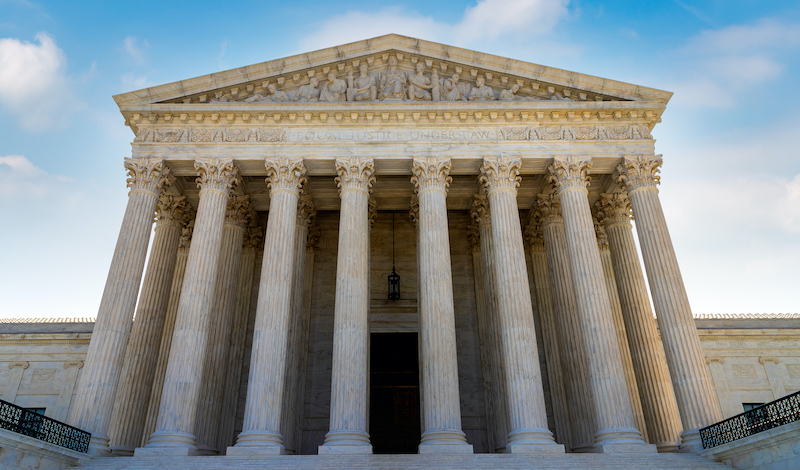
Scholars argue that antitrust law can complement antidiscrimination law in the fight against systemic racism.
Either people support policies that lead “to racial inequities and injustice,” Ibram X. Kendi remarked, or they push “policies that are leading to justice and equity for all.” Antitrust law is not immune from Kendi’s call for antiracist policies, according to a recent article authored by four legal experts.
Although antitrust law addresses “violations of free market norms, not equality norms,” the article’s authors—Joshua P. Davis, Eric L. Cramer, Reginald L. Streater, and Mark R. Suter—argue that antitrust can also address areas where the free market and equality issues overlap. They find that antitrust law can complement antidiscrimination law in addressing systemic racism.
Systemic racism is the product of social and economic structures that are “designed in a way that places people of color at a disadvantage,” they argue. They note that antidiscrimination law fails to address the systemic aspects of racism because it focuses on how individual employers, rather than entire systems, discriminate against their employees.
Davis and his coauthors claim that antitrust law, rather than antidiscrimination law, can address “how an entire market is structured and whether a firm has exploited the structure of a market—or distorted it—to its advantage.” Antitrust law could, for example, target a merger or acquisition that increases a firm’s market power over its employees or an agreement between competing firms that reduces employee bargaining power.
Furthermore, antitrust law can garner more public support to combat systemic racism, Davis and his coauthors argue. Since some types of explicit discrimination in housing, public accommodations, and employment have been prohibited, Davis and his coauthors note that “racism has been driven underground” in the form of race-neutral policies that disproportionately harm people of color. Efforts to combat race-neutral policies cannot rely on evidence that people are treated differently because of racial differences, they argue.
Antitrust law can address one consequence of systemic racism—disproportionately low levels of wealth for Black people compared to other groups in the United States—better than antidiscrimination law, Davis and his coauthors explain. They claim that this ability is one example of antitrust law’s advantage in combating race-neutral policies.
Successful employment discrimination lawsuits require that a protected group, such as minority employees, are treated worse than workers not in that protected group, such as white employees. This negative treatment can include, for example, minority employees receiving lower compensation than white employees.
But systemic racism can harm all employees while disproportionately affecting people of color, Davis and his coauthors point out. Policies that target low-income communities “can reflect the operation of systemic racism” because “people of color are disproportionately represented among the poor and jobless.” Davis and his coauthors claim that antitrust law can provide redress when firms’ owners or managers, who are disproportionately white men with capital, exploit their workers, who are disproportionately, but not entirely, people of color.
Davis and his coauthors emphasize that antitrust law can benefit not only people of color, but also vulnerable white employees. It can “increase the pie available to all disempowered people” by obtaining compensation for all underpaid workers, regardless of race.
By aligning the interests of low-income white people and people of color, antitrust law can offer a less politically divisive method of combating systemic racism, according to Davis and his coauthors. Furthermore, they argue that antitrust law’s reliance on “centrist free market principles” may be “less controversial than tackling issues of race directly,” offering a valuable tool when other methods become politically infeasible.
Davis and his coauthors situate their argument for antiracist antitrust law in the context of Cung Le v. Zuffa—a pending case involving a class of Mixed Martial Arts (MMA) fighters who are suing the owners of the Ultimate Fighting Championship (UFC).
The plaintiffs in the Cung Le case allege that the UFC gained market power partly through “the use of long-term exclusionary contracts with fighters” that resulted in the fighters being paid “significantly less than the fighters would have earned in a competitive marketplace.” The UFC’s roster includes a significant number of fighters of color, and the UFC has a “well-documented history with racism, white supremacy, and the far right” that could have contributed to these policies, Davis and his coauthors argue.
They claim that, in light of the allegations at the heart of the Cung Le case, antitrust litigation holds “several key advantages over prospective employment discrimination litigation.” The UFC’s disproportionately white managers and owners allegedly “distorted the entire market for professional MMA fighters’ services.” Antitrust law can better address this case, according to Davis and his coauthors, because the case involves “the cumulative effect of all of the long-term contracts on the market as a whole” rather than individual fighters contesting their contracts. The Cung Le plaintiffs seek to “shift revenues from ownership and management to workers,” including, but not limited to, fighters of color, which does not require comparing compensation by race.
Furthermore, Davis and his coauthors argue that the fighters’ arguments will be popular among judges and jurors because they “seek to vindicate well-recognized principles for free market competition” and punish the UFC “for using anticompetitive tactics rather than competing on the merits.”
Davis and his coauthors acknowledge that antitrust law has limitations in addressing systemic racism. Congress intended antitrust law to address market efficiency, rather than racism. Although some economists recognize the effect of racism on markets, antitrust law “is not built to detect or rectify racism.” Davis and his coauthors recognize that other scholars insist that antitrust law is ill equipped to address public policy goals beyond maintaining competitive markets.
Moreover, “the free market, as conceived and defined by courts, can often allow for what many would consider financial exploitation of workers,” Davis and his coauthors caution. Antitrust law’s consumer welfare standard, for example, could justify firms harming workers if those harms produce consumer benefits, such as low prices.
Davis and his coauthors conclude that antitrust law should complement, not substitute, antidiscrimination law. They say that antitrust lawsuits can “contribute valuably to racial equality” best when working in tandem with antidiscrimination lawsuits.



